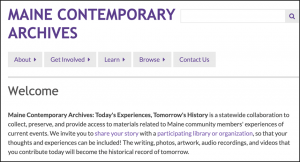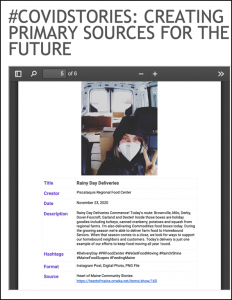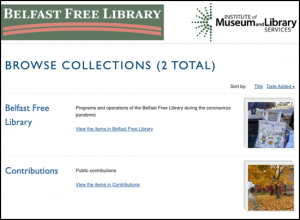by Lisa Jenkins

In this “time of COVID,” libraries and archives have reached out to their communities to both provide support and help chronicle the lives of everyday people, collecting oral histories, videos, poetry, art, and more. The Maine Contemporary Archives project serves as an especially good example of cultural heritage professionals working to document the lives of their community members over the past year.
The Maine Contemporary Archives website, run by the Maine Contemporary Archives Collaborative and hosted on Omeka, links out to the projects run by over a dozen Maine institutions. These are mostly Omeka sites run by public libraries, like Heart of Maine Community Stories and How’s Your Week Going? COVID-19 Story Archive, but also consist of projects from academic institutions and cultural organizations. The website is a treasure trove of information for all Maine residents looking to learn more about how their neighbors are documenting COVID. It is also an especially helpful resource for teachers and parents.
Education and Archival Advocacy
The Maine Contemporary Archives Collaborative has created lesson plans that encourage students to reflect on and document their pandemic experiences, interpret and engage with primary source materials, and learn terminology like “archive,” “metadata,” and “primary source.” More complex terms can be found on a Glossary page. What is special about this project is that students can apply their learning to resources that their own communities generate at this point in time.
The lesson plans are also a great example of advocacy for cultural heritage professionals because they demonstrate to young people what archivists and librarians do every day, and especially during this pandemic. Children from elementary to high school can learn about careers they hadn’t previously considered or fully understood.
For many people, archives feel like a place that stores old things. With this  project, cultural heritage professionals demonstrate to young learners (and older learners!) that archives are dynamic environments that document history as it happens, and that community submission and engagement are key parts of that process. The website’s About Archives page makes it clear that materials collected will comprise the public record and benefit future communities, pushing the narrative that archives are active places of history creation.
project, cultural heritage professionals demonstrate to young learners (and older learners!) that archives are dynamic environments that document history as it happens, and that community submission and engagement are key parts of that process. The website’s About Archives page makes it clear that materials collected will comprise the public record and benefit future communities, pushing the narrative that archives are active places of history creation.
Benefiting From Collaboration While Retaining Local Autonomy
The Maine Contemporary Archives Collaborative invites “Libraries, historical societies, museums, schools, and community organizations” to participate by creating their own Omeka sites or working with a pre-established project. They also invite participants to join weekly meetings to share skills and experiences.
The Maine Contemporary Archives notes that anyone from across the state can share stories on My Maine Stories, but that visitors should first check out the websites of their local institutions, which may have their own focuses and projects. For example, both the Bangor Area Community Archives Project and the Belfast Free Library COVID-19 Community Archives ask for residents to contribute items, but they allow for different types of submissions, with Belfast including audio uploads as an option while Bangor does not.
And all websites have different styles and designs to best reflect the materials  they collect and display. But these institutions don’t just rely on contributions; they create their own materials. For example, Belfast’s two digital item collections are called Belfast Free Library, which highlights the programming that the library has hosted during the pandemic, and Contributions, to which residents can submit materials. Their Library collection contains images from and descriptions of programs like Halloween events and summer reading prizes, publicizing their own hard work as professionals and demonstrating their role as a member of and leader in the community during this time.
they collect and display. But these institutions don’t just rely on contributions; they create their own materials. For example, Belfast’s two digital item collections are called Belfast Free Library, which highlights the programming that the library has hosted during the pandemic, and Contributions, to which residents can submit materials. Their Library collection contains images from and descriptions of programs like Halloween events and summer reading prizes, publicizing their own hard work as professionals and demonstrating their role as a member of and leader in the community during this time.
However, not all projects are equally good at attracting contributors. Some websites have little to no community contributions while others showcase dozens of items submitted by the public. This discrepancy can be due to any number of factors, but the Collaborative does try to help its member sites by way of a Facebook page and ways to share ideas about getting the word out.
An Example for Professionals in Other Regions
The creators of this site are advocates for their profession and their institutions and are invested in how they can involve their patrons and include their communities in the historical record. Their project serves as a testament to the power of collaboration through the sharing of skills and resources, and provides a solid example for professionals in other states and regions.
